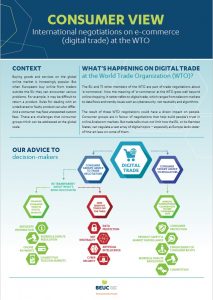Consumers now buy things from anywhere in the world in a few clicks. But consumer groups’ research shows the safety of these products is not always guaranteed. Online shops are urged to act responsibly and authorities should work together across borders, by doing joint market checks or product recalls.
“Revealed: the terrifying smoke alarms that will fail when you need them”, UK consumer group Which? reported in May. They found smoke alarms were being sold online that failed to detect smoke. It is another example of unsafe products reaching European consumers through online shops. Can we ever be sure what we’re buying online is safe?
I ask this as trade experts gather in Geneva for the World Trade Organization (WTO) public forum. EU trade negotiators are also discussing a worldwide agreement on e-commerce with 51 other WTO countries, with the priority to enhance consumer trust. This is an opportunity to address the problems associated with online shopping.
Chemicals in toys and smoke alarms that fail to detect smoke
Consumers now buy things from anywhere in the world in a few clicks. Which is why the WTO should look at online product safety.
Our research shows this safety is not guaranteed. Denmark’s Forbrugerrådet Tænk found toys that contain endocrine-disrupting phthalates. And Germany’s Stiftung Warentest reported popular slime toys for kids are giving off way too much boron, a chemical which is harmful to health in higher concentrations.
In this video, Which? explains their smoke alarm research.
Online shops – or marketplaces – are complex: Sometimes they sell products themselves. Other times they allow third-party traders to sell their products through their websites. And these traders are not controlled enough. Shops must take greater responsibility and regulators must step in to prevent a wild west scenario.
Safety pledges by online shops need more work
Authorities are taking action. Four major online marketplaces signed the Product Safety Pledge with the European Commission in 2018. With it they voluntarily agreed to quickly remove unsafe products from their websites.
A recent update report concludes that 87% of problematic products were removed in two working days. However, this was not communicated to consumers who had already bought the products. The report also lacks detail: How many products were taken down? What were the safety issues? From where did they come?
This is important as people shop in far-away places. Some even do so unwittingly because a trader’s location isn’t always clear.
Online shopping from across the world
Canada, Turkey, India… There really is no country anymore Europeans won’t buy from. A popular country to shop from is of course China. Yet more than half of unsafe products in Europe in 2018 came from there.
Electronics and toys on the European market need a CE marking with which manufacturers self-certify that they are safe. Yet Belgium’s Test Aankoop/Test Achats says this doesn’t guarantee safety, as the consumer group found CE-marked USB chargers that could catch fire or explode. The failing smoke alarms revealed by Which? were all sold through Chinese re-sellers.
In the Netherlands, Dutch authorities had told BEUC member Consumentenbond that people ought to take care buying directly from Chinese web shops, as their products are often not made for a European market and might not meet its safety requirements. The Dutch are advised to avoid electronics, clothes, jewellery, cosmetics and toys that seem unreasonably cheap.
Now this is not a cautionary tale against buying online, whether from Europe, China or elsewhere. But governments must beware that online shopping is a market surveillance challenge of global proportions.
Global market checks to keep consumers safe
So what can be done? We can’t ask online shoppers to check whether a product is safe. They have other jobs, lives to lead and cannot be safety experts in their spare time. Online shops should act responsibly and keep people safe by complying with the safety and e-commerce rules from the consumer´s country of residence.

A huge task lies with authorities to plan concrete actions together, such as joint market checks. Or coordinating product recalls across the globe so unsafe products are removed from the market everywhere and at the same time. We need close cooperation between product safety and customs authorities within countries and between countries.
WTO discussions in Geneva can get the ball rolling. It’s good that government trade experts from across the globe discuss e-commerce. But they need to team up with government departments in charge of consumer safety and market authorities so that dangerous products will not be sold online to consumers.
Governments looking at updating the global rulebook on e-commerce must address the issue of product safety in parallel. Facilitating e-commerce should not put consumers at risk.
This blog was originally published on the BEUC website.